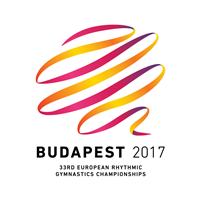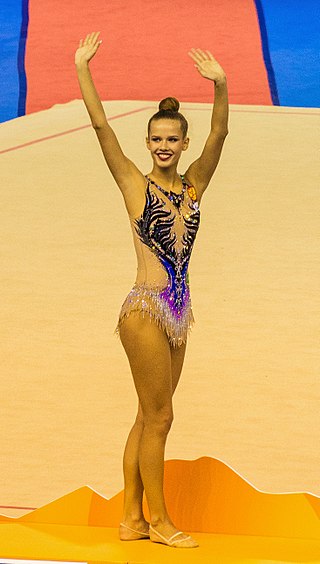Format
| Date | Event | Location |
|---|---|---|
| March 12–14 | Deriugina Cup | |
| March 25–28 | Donau Cup | |
| April 9–11 | Grand Prix | |
| April 16–17 | Gymnastics Masters | |
| September 10–12 | Alfred Vogel Cup | |
| October 23–24 | Grand Prix | |
| November 19–21 | Grand Prix Final | |
The 1999 Rhythmic Gymnastics Grand Prix circuit was a series of competitions in rhythmic gymnastics. [1] [2] [3] [4] [5] [6] [7] [8] [9]
| Date | Event | Location |
|---|---|---|
| March 12–14 | Deriugina Cup | |
| March 25–28 | Donau Cup | |
| April 9–11 | Grand Prix | |
| April 16–17 | Gymnastics Masters | |
| September 10–12 | Alfred Vogel Cup | |
| October 23–24 | Grand Prix | |
| November 19–21 | Grand Prix Final | |
| Competitions | Gold | Silver | Bronze |
|---|---|---|---|
| Kiev | | | |
| Bratislava | | | |
| Thiais | | | |
| Ludwigsburg | | | None awarded |
| Deventer | | | |
| Moscow | | | |
| Korneuburg | | | |
| Competitions | Gold | Silver | Bronze |
|---|---|---|---|
| Kyiv | | | |
| Bratislava | | | |
| Thiais | | | |
| Ludwigsburg | | | |
| Deventer | | | |
| Moscow | | | |
| Korneuburg | | | |
| Competitions | Gold | Silver | Bronze |
|---|---|---|---|
| Kyiv | | | |
| Bratislava | | | |
| Thiais | | | |
| Ludwigsburg | | | |
| Deventer | | | |
| Moscow | | | |
| Korneuburg | | | |
| Competitions | Gold | Silver | Bronze |
|---|---|---|---|
| Kyiv | | | |
| Bratislava | | | |
| Thiais | | | |
| Ludwigsburg | | | |
| Deventer | | None awarded | |
| Moscow | | | |
| Korneuburg | | | |
| Competitions | Gold | Silver | Bronze |
|---|---|---|---|
| Kyiv | | | |
| Bratislava | | | |
| Thiais | | | |
| Ludwigsburg | | | |
| Deventer | | | |
| Moscow | | | |
| Korneuburg | | | |
| Rank | Nation | Gold | Silver | Bronze | Total |
|---|---|---|---|---|---|
| 1 | 20 | 14 | 10 | 44 | |
| 2 | 11 | 7 | 13 | 31 | |
| 3 | 5 | 14 | 12 | 31 | |
| Totals (3 entries) | 36 | 35 | 35 | 106 | |

Jana Berezko-Marggrander is a German retired individual rhythmic gymnast. She is the 2010 Youth Olympic all-around bronze medalist.
The Rhythmic Gymnastics World Cup is a competition for rhythmic gymnastics sanctioned by the Fédération Internationale de Gymnastique (FIG). It is one of the few tournaments in rhythmic gymnastics officially organized by FIG, as well as the World Championships, the gymnastics competitions at the Olympic Games and the Youth Olympics, and the rhythmic gymnastics events at the World Games. The World Cup series should not be confused with the Rhythmic Gymnastics Grand Prix series, which is neither officially organized nor promoted by FIG.
The Rhythmic Gymnastics Grand Prix is an annual competition of tournaments in rhythmic gymnastics open to athletes from all over the globe. The series consists of a number of stages, culminating in the final event, usually referred to as Grand Prix Final. The Grand Prix circuit usually hosts some of the most watched yearly events in rhythmic gymnastics, frequently gathering some of the best gymnasts in the world. The Grand Prix series should not be confused with the Rhythmic Gymnastics World Cup series, which is a competition officially organized by the Fédération Internationale de Gymnastique (FIG), whereas the Grand Prix is neither organized nor promoted by FIG.

Katsiaryna Aliaksandraŭna Halkina is a retired Belarusian individual rhythmic gymnast. She is the 2018 European all-around bronze medalist. She competed at the 2016 Summer Olympics in Rio, and finished 6th in the all-around final.
The 2014 FIG World Cup circuit in Rhythmic Gymnastics includes one category A event (Stuttgart) and eight category B events. Except for Corbeil-Essones, which is a competition for individuals only, all tournaments feature Individual and Group competitions. The All-around medal event also serves as qualification for the apparatus finals.
The 2015 FIG World Cup circuit in Rhythmic Gymnastics includes seven category B events. Except for Bucharest, which is a competition for individuals only, all tournaments feature Individual and Group competitions. The All-around medal event also serves as qualification for the apparatus finals.
FIG World Cup refers to a number of events organized by the International Gymnastics Federation (FIG) across seven competitive gymnastics disciplines: 1) acrobatic gymnastics, 2) aerobic gymnastics, 3) men's artistic gymnastics, 4) women's artistic gymnastics, 5) women's rhythmic gymnastics, 6) trampoline and tumbling, and 7) parkour.

The 2017 Rhythmic Gymnastics World Championships, the 35rd edition, was held in Pesaro, Italy, from 30 August to 3 September 2017.

The 2017 Rhythmic Gymnastics European Championships was the 33rd edition of the Rhythmic Gymnastics European Championships, which took place on 19–21 May 2017 at the László Papp Budapest Sports Arena. in Budapest, Hungary.

Ekaterina Sergeevna Selezneva is a Russian individual rhythmic gymnast. She is the hoop world champion in the Rhythmic Gymnastics World Championships 2019. She is also the 2018 Grand Prix Final All-around champion and the 2019 Summer Universiade All-Around gold medalist. On the national level, she is the 2018 Russian National all around bronze medalist.
The 2011 FIG World Cup circuit in Rhythmic Gymnastics includes one category A event (Sofia) and nine category B events. With stopovers in North America, Europe and Asia, the competitions took place on January 29–30 in Montreal (CAN), March 25–27 in Pesaro (ITA), April 15–17 in Kalamata (GRE), April 23–24 in Nizhny Novgorod (RUS), April 28 – May 1 in Portimão (POR), May 6–8 in Kyiv (UKR), May 13–15 in Corbeil-Essonnes (FRA), August 20–21 in Sofia (BUL), August 26–27 in Tel-Aviv (ISR) and September 5–7 in Tashkent (UZB). Two events were open to individual athletes, two were open to groups and six were open to both individual athletes and groups. In all of the events, all-around competitions served as qualifications for the finals by apparatus. The world ranking points collected by the competitors at their best four World Cup events added up to a total, and the top scorers in each event were crowned winners of the overall series at the final event in Tashkent, Uzbekistan.
The 2010 FIG World Cup circuit in Rhythmic Gymnastics includes six category A events and two category B events. With stopovers in North America and Europe, the competitions took place on January 30–31 in Montreal (CAN), March 6–7 in Debrecem (HUN), March 11–14 in Portimão (POR), March 26–28 in Kalamata (GRE), April 3–4 in Saint Petersburg (RUS), May 7–9 in Corbeil-Essonnes (FRA), May 21–23 in Minsk (BLR) and August 27–29 in Pesaro (ITA). Two events were open only to individual athletes, while six were open to both individual athletes and groups. In all of the events, all-around competitions served as qualifications for the finals by apparatus. The world ranking points collected by the competitors at their best four World Cup events added up to a total, and the top scorers in each event were crowned winners of the overall series at the final event in Pesaro, Italy.
The 2009 FIG World Cup circuit in Rhythmic Gymnastics includes six category A events and two category B events. With stopovers in Europe only, the competitions took place on March 6–8 in Budapest (HUN), April 4–5 in Saint Petersburg (RUS), April 16–19 in Portimão (POR), April 25–26 in Maribor (SLO), April 30 – May 2 in Pesaro (ITA), May 8–10 in Corbeil-Essonnes (FRA), August 15–17 in Kyiv (UKR) and August 21–23 in Minsk (BLR). Two events were open only to individual athletes, while six were open to both individual athletes and groups. In all of the events, all-around competitions served as qualifications for the finals by apparatus. The world ranking points collected by the competitors at their best four World Cup events added up to a total, and the top scorers in each event were crowned winners of the overall series at the final event in Minsk, Belarus.
The 2023 Rhythmic Gymnastics Grand Prix circuit is a series of competitions in rhythmic gymnastics.
The 2002 Rhythmic Gymnastics Grand Prix circuit was a series of competitions in rhythmic gymnastics.
The 1996 Rhythmic Gymnastics Grand Prix circuit was a series of competitions in rhythmic gymnastics.
The 2000 Rhythmic Gymnastics Grand Prix circuit was a series of competitions in rhythmic gymnastics.
The 1998 Rhythmic Gymnastics Grand Prix circuit was a series of competitions in rhythmic gymnastics.